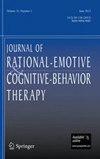A Review of the Literature of REBT for Traumatized People
IF 1.4
4区 心理学
Q3 PSYCHOLOGY, CLINICAL
Journal of Rational-Emotive and Cognitive-Behavior Therapy
Pub Date : 2022-08-31
DOI:10.54382/krecbt.2022.2.2.7
引用次数: 0
Abstract
The purpose of this study is to examine the effects of the Rational emotional behavior therapy on the subjects who experienced trauma. The subjects of this study were experimental studies within the last ten years that provided REBT intervention to trauma subjects. In this study, the characteristics of REBT program applied to trauma-experienced people were reviewed and analyzed as what should be considered when developing the REBT program in the future. For this purpose, the types of trauma, specific methods of REBT application, and verification of effectiveness were summarized. The study results showed that REBT theory is suitable and valuable for dealing with irrational beliefs related to traumatic experiences. However, it is necessary to consider RCT designs and homogeneous subjects to maintain the effect size and secure sufficient scientific evidence in REBT intervention. Nevertheless, if the uniqueness and merits of REBT are fully reflected, it will be an effective intervention for trauma subjects. This study suggests various implications for REBT development for trauma subjects and will contribute to the development and spread of REBT in the future.创伤后心理康复的文献综述
本研究的目的是探讨理性情绪行为疗法对经历创伤的被试的效果。本研究的对象是近十年来为创伤受试者提供REBT干预的实验性研究。在本研究中,回顾和分析了创伤经历者的REBT项目的特点,作为未来发展REBT项目时应考虑的问题。为此,本文对创伤类型、REBT应用的具体方法以及有效性的验证进行了综述。研究结果表明,REBT理论适用于处理创伤性非理性信念。然而,有必要考虑随机对照试验设计和同质受试者,以保持REBT干预的效应大小并确保足够的科学证据。然而,如果REBT的独特性和优点得到充分体现,它将是一种有效的创伤受试者干预手段。本研究为创伤受试者的REBT发展提供了多种启示,并将有助于REBT在未来的发展和推广。
本文章由计算机程序翻译,如有差异,请以英文原文为准。
求助全文
约1分钟内获得全文
求助全文
来源期刊

Journal of Rational-Emotive and Cognitive-Behavior Therapy
PSYCHOLOGY, CLINICAL-
CiteScore
3.50
自引率
18.80%
发文量
49
期刊介绍:
The Journal of Rational-Emotive and Cognitive Behavior Therapy is an international journal that publishes scholarly original papers concerning Rational Emotive Behavior Therapy (REBT), Cognitive Behavior Therapy (CBT), behavior therapy, cognitive-behavioral hypnosis, and hypnotherapy, clinical and counseling psychology, psychiatry, mental health counseling, and allied areas of science and practice. The journal encourages scholarly debate amongst professionals involved in practice, theory, research, and training in all areas of scholarship relevant to REBT and CBT. The Journal is particularly interested in articles that define clinical practice and research and theoretical articles that have direct clinical applications. The Journal seeks theoretical discussions and literature reviews on the cognitive bases of the development and alleviation of emotional, behavioral, interpersonal, personality, and addictive disorders. We consider submissions on the applications of REBT and CBT to new areas of practice and client populations. The Journal considers the term Cognitive Behavior Therapy to represent a generic, overriding category or school of psychotherapy approaches that includes many different theories and techniques. The journals encourages research that clearly identifies the specific hypothetical constructs and techniques being measured, tested, and discussed, and the comparison of the relative influence of different cognitive processes, constructs, and techniques on emotional and behavioral disturbance. The Journal provides a timely introduction to unexplored avenues on the cutting edge of REBT and CBT research, theory, and practice.The Journal publishes:discussions of the philosophical foundations of psychotherapiestheory-buildingtheoretical articlesoriginal outcome research articlesbrief research reportsoriginal research on the support of theoretical models development of scales to assess cognitive and affective constructsresearch reviewsclinical practice reviewsempirically-based case studiesdescriptions of innovative therapeutic techniques and proceduresadvances in clinical trainingliterature reviews book reviewsUnder the guidance of an expanded, international editorial board consisting of acknowledged leaders in the field, the journal disseminates current, valuable information to researchers and practitioners in psychology, psychotherapy, psychiatry, mental health counseling, social work, education, and related fields.Manuscripts usually are less than 35 pages, double-spaced, and using 11 or 12-point font. If the authors need more space to communicate their research or ideas, they should write to the editors to discuss this issue and provide a rationale why more than the commended number of pages is needed.
 求助内容:
求助内容: 应助结果提醒方式:
应助结果提醒方式:


